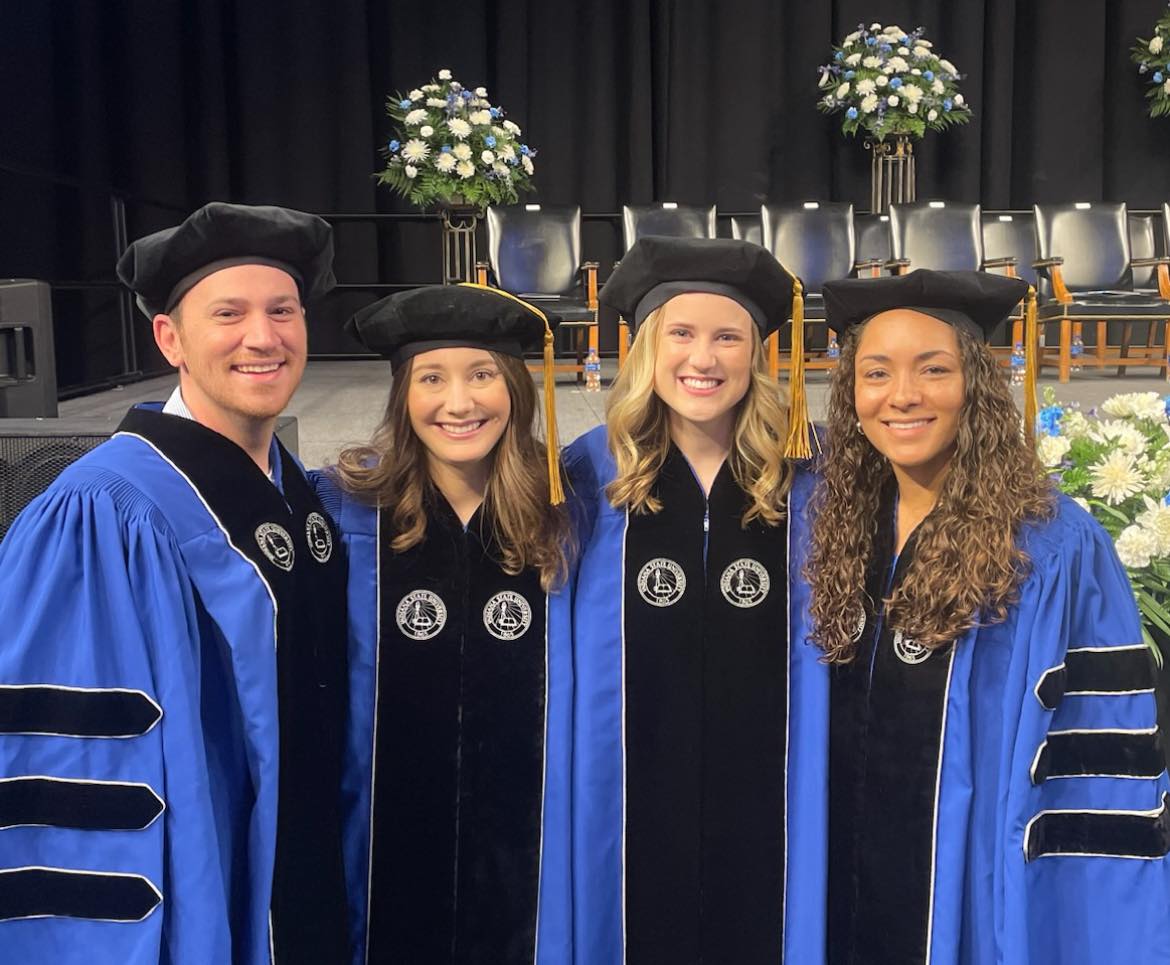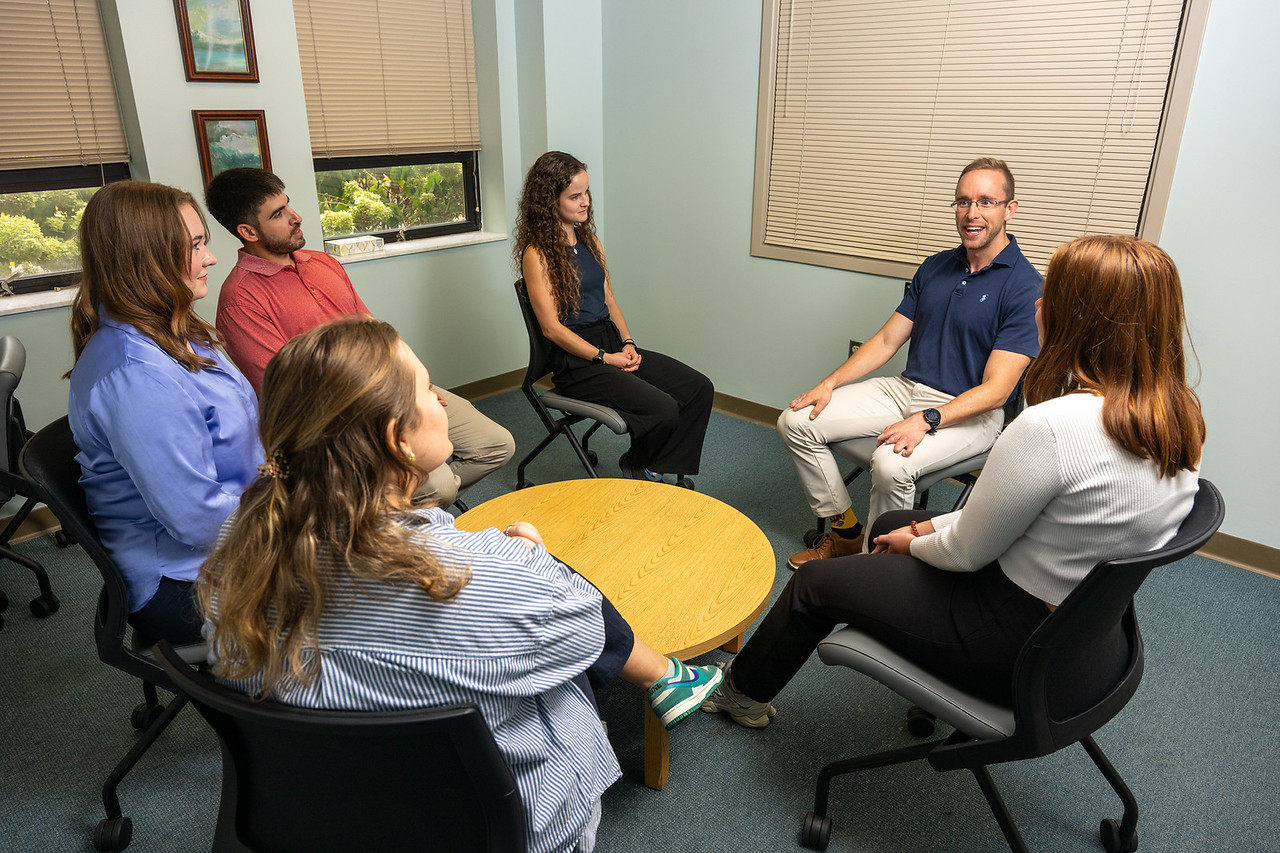Program Availability
The PsyD Program is a traditional, on-campus program offered on the Indiana State University campus in Terre Haute, Indiana. The program is open to U.S. and international applicants. Admission is very competitive.
Why Earn a PsyD at Indiana State?
Indiana State’s Clinical Psychology PsyD has been known for excellence for more than 38 years. Over the past 5 years, we have had 98% placement among students who participated in the Internship match. The program has maintained continuous accreditation by the American Psychological Association (APA) since 1985. Learn more about why APA accreditation matters. Questions related to the program's accredited status should be directed to the Commission on Accreditation:
Office of Program Consultation and Accreditation
American Psychological Association
750 1st Street NE
Washington, D.C. 20002
Phone (202)336-5979 / Email: apaaccred@apa.org / Web: www.apa.org/ed/accreditation
Student Admissions, Outcomes, and Other Data
Clinical Training and Research Begin in the First Year
Indiana State University’s Doctor of Psychology (PsyD) Program is designed to prepare clinical psychologists to offer a variety of professional services in psychological treatment, assessment, consultation, and administration. The program follows the scientifically based practitioner model of training (practitioner-scientist model).
Our program seeks to develop in the student a professional identity that values and pursues: excellence in clinical practice; a spirit of active inquiry and critical thought; a commitment to the development and application of new knowledge in the field; an active sense of social responsibility; an appreciation and respect for the significant impact of cultural and individual differences in all aspects of practice and inquiry; and an enduring commitment to personal and professional development.
Indiana State’s PsyD involves students in clinical coursework and training beginning in the program’s first year. We also encourage students to become involved in faculty research early in the program in preparation for developing a dissertation research project. Given that our program requires a dissertation, the emphasis on research is somewhat greater than in other PsyD programs.
We have approximately 30-35 students on campus each year (1st-4th year students, 6-8 per cohort) and 6-8 students on internship. Our students come from a variety of backgrounds and many different parts of the U.S. Almost all students have a bachelor's degree in psychology and typically 1-2 students each year enter with a master's degree or having completed some graduate coursework.
Our Commitment to Diversity
The PsyD Program at ISU adheres to the belief that thoughtful training in diversity issues is crucial in developing a professional identity that values and pursues excellence in clinical practice. In addition, we are committed to creating a culture of acceptance and inclusion that values the contribution of diverse perspectives such as those influenced by gender, ethnicity, race, culture, sexual orientation, age, religion, disability, and personal experience. The program strives to develop in our students a professional identity grounded in an active sense of social responsibility combined with an appreciation and respect of cultural and individual differences.
Program Sequence
The PsyD typically involves five years of study, including four years of academic study and one year of internship. Requirements for the degree include successful completion of 100 credits of coursework in core clinical and basic psychology areas and a clinical internship.
Clinical experience is obtained through a practicum in the University’s Psychology Clinic, third- and fourth-year off-campus practicum experience, and a full-year internship, typically completed in the 5th year.
Students must pass oral preliminary examinations. A dissertation and oral defense of the dissertation must also be completed. A master’s degree is obtained after two years of study based on completion of required courses and demonstration of basic proficiency in a specified set of clinical and research skills.
Sequence of Courses for the PsyD Program
About Our Faculty
As a graduate student in the Department of Psychology, you will benefit from small classes taught by dedicated faculty mentors with diverse expertise and experience. All hold advanced degrees and all clinical faculty are licensed psychologists. All tenure-track faculty are actively involved in research and welcome student involvement.
The Psychology Clinic
As a graduate student in the PsyD Program, you will gain firsthand experience in the Psychology Clinic, which is part of the Psychology Department at Indiana State University.
The clinic is a nonprofit professional training facility for doctoral students in clinical psychology who are supervised by licensed faculty and staff. Students are trained in evidence-based assessment and intervention skills. Clients are community members from Terre Haute and surrounding areas. The clinic is dedicated to clinician multicultural awareness and clinical competence in working with diverse populations.
Students in the PsyD Program use the clinic for their training throughout the time they are at Indiana State University. First-year students observe therapy sessions conducted by more advanced students and also attend weekly group supervision. Second- and third-year students provide therapy and assessment services for a caseload of 3-4 clients. Fourth-year students provide peer supervision for second-year students in the program.
Students are taught to use an evidence-based approach to clinical decision making which emphasizes client preference and characteristics and clinician knowledge and experience in addition to clinical research. Students develop foundational skills in Cognitive Behavioral therapy (CBT) and are also exposed to other orientations and techniques through work with different supervisors.
Explore Our Faculty Research Labs
- Our ADHD Lab is engaged in a number of projects related to evaluation for ADHD among children as well as influence of parent mental health and parenting style of child behavior.
- Our Adversity, Dissociation, and Psychological Trauma (ADAPT) Lab is focused on posttraumatic stress disorder, dissociation, and other trauma-related mental health conditions.
- Our Correctional & Forensic Psychology Lab is primarily focused on correctional and forensic populations as well as issues related to the intersection of psychology and the criminal justice system.
- Our Evolution, Violence, and Empowerment (EVE) Lab investigates how women navigate threats of sexual violence through evolved psychological mechanisms, social alliances, and strategic behavior.
- Our Lifespan Cognition & Brain Stimulation (LCABS) Lab is engaged in several projects related to evaluating cognition in young and older adults, using non-invasive brain stimulation, particularly how the cerebellum contributes to non-motor cognitive behavior across the lifespan.
- Our Mental Health Development Lab is primarily focused on psychological measurement, including personality and neurocognitive indicators of liability to mental illness and endophenotypic markers of liability to schizophrenia and schizotypy.
- Our Metacognition for Recovery, Growth, and Engagement (MeRGE) Lab investigates how metacognition shapes recovery, growth, and meaningful engagement for people living with serious mental illness.
- Our Social & Environmental Psychology Lab conducts research projects in four areas, including close relationships, environmental symbolism & meaning, socio-spatial behavior, and evolutionary bases of behavior
What You’ll Learn in the PsyD Program
The primary objective of the PsyD Program is to equip graduates for the skilled delivery of clinical services. The emphasis is on individualized clinical supervision, combined with broad practical experience and research training oriented toward clinical applications.
The program is intended to train professional psychologists who will have a firm grounding in the foundations of psychology, including biological, cognitive, social, affective, and developmental aspects of behavior. In terms of clinical skills, students are trained to apply knowledge of functional and dysfunctional behavior to the assessment and diagnostic process and to make use of assessment to develop evidence-based interventions and to evaluate intervention effectiveness. Consistent with the generalist training goals of the program, students are trained to work with a wide range of clients across the age span.
The program requires a total of 100 credits, including:
- Psychology core (27 credits)
- Clinical/professional core (30 credits)
- Other required courses (43 credits), including a clinical practicum (11 credits), an external practicum (4 credits), electives (15 credits), a dissertation (12 credits), and an internship (1 credit).
Students earn a master’s degree, as part of the 100 total credits, after the second year of the program. Completing requirements for the master’s degree involves demonstrating proficiency in specific clinical and research skills and is required for students who do not enter the program with a master’s degree.
Financial Assistance and Scholarships
Most students accepted into the PsyD Program receive some form of financial assistance, which is renewable each year. Fellowship awards carry a tuition and fee waiver, exclusive of building and student services fees, for up to 18 credits per academic year. Students often receive assistantships in their first two years of the program as well.
Other forms of funding are available to support conference travel and presentation of research. Additionally, continuing PsyD students can apply for a merit-based scholarship ($1500; only eligible to receive the scholarship once).
Transfer Credit
Students entering the program with previous graduate work should not assume automatic transfer of credit for graduate courses. After arrival, transfer credit will be evaluated on a course-by-course basis. Up to nine credit hours may be transferred for graduate credit. To be eligible for transfer credit, the course must be judged to be comparable to a required ISU course and should have been taken within the past four years; the student should have earned a grade of A or higher in the course and may be required to demonstrate the requisite skills associated with the course.
Career Possibilities for Psychology Graduates
The majority of our graduates are employed in primary healthcare settings such as hospitals, Veteran’s Administration hospitals or clinics, public or private outpatient clinics, and correctional facilities.
Many of our graduates move into supervisory and/or administrative positions within the first five years of employment. Several of our alumni are employed in academic positions within a clinical setting (i.e., teaching hospital).
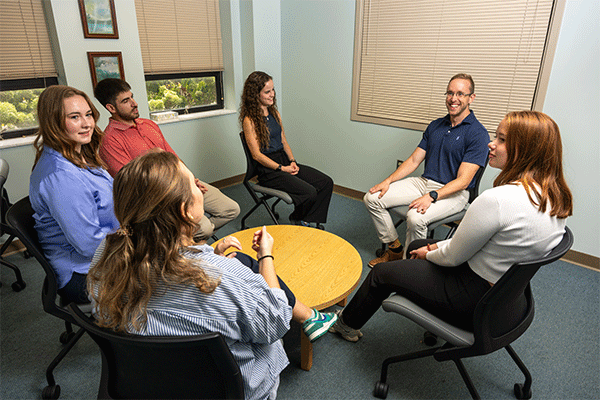
Hands-On Training in the Psychology Clinic
The Psychology Clinic at Indiana State University is a nonprofit training facility where Clinical PsyD students gain practical experience providing therapy, conducting assessments, and supporting clients. Join Clinic Director and Senior Instructor Katheryn Ocampo, PhD, for a quick tour of the clinic!
Take a look inside.The Doctor of Psychology (PsyD) program has been accredited by the (APA) since 1985. Questions related to the program's accredited status should be directed to the Commission on Accreditation:
Office of Program Consultation and Accreditation
American Psychological Association
750 1st Street NE
Washington, D.C. 20002
Phone (202)336-5979 / Email: apaaccred@apa.org / Web: www.apa.org/ed/accreditation
Admission Requirements and Application Instructions
Admission into the Clinical PsyD program is competitive, and enrollment is generally limited to 7 - 8 students per year. Applicants are selected for admission on the basis of undergraduate and graduate (if applicable) grades, letters of reference, clinical and research interests, significant accomplishments, and virtual as well as in-person interviews.
Applicants must meet the following minimum requirements.
Admission Requirements
Applicants must possess a bachelor’s degree from a regionally accredited institution (for international students, a degree granted by a recognized institution) with at least 24 credits in psychology. These credits must include coursework in Abnormal Psychology, Research Methods or Experimental Psychology, and Statistics. In addition, it is preferred that students have taken a course in learning or cognition and personality.
Applicants must have a minimum cumulative 3.0 grade point average (on a 4.0 scale) in all undergraduate coursework, or a graduate GPA (if more than nine graduate credit hours in Psychology) of 3.5 on a 4.0 scale.
Three letters of reference. These letters will ideally come from psychology professors and/or mental health professionals who are familiar with your academic and/or professional and interpersonal competence and can speak competently to your ability to succeed in a doctoral program in clinical psychology. Letters from individuals who are familiar with doctoral training in psychology are strongly preferred.
Important: Have the email addresses for your references available at the time that you are completing your admission application, as you will need to enter them in the online application. Explain to your references that they will receive an email from Indiana State University requesting that they submit a letter of recommendation. Please ensure that your references expect to receive this request. It will be sent to your references immediately upon completing the application.
Applications for admission are accepted between September 1 and December 1 for the Fall cohort. All materials must be received by the deadline. Applications and application materials received after December 1 will not be considered for admission.
A departmental application and personal statement are required. Please refer to the Application Instructions section below for links to these documents.
Interviews for Admission
Interviews for admission are held on an invitation-only basis. Approximately 40% of applicants are invited to participate in an online (Zoom) interview to occur in late January.
Following these interviews, applicants judged to have a high likelihood of being offered admission into the program will be invited to a follow-up, on-campus interview. When possible, we try to accommodate scheduling conflicts for those applicants who are invited to interview but cannot come on one of our scheduled interview dates. Travel costs for all interviews are assumed by the applicant.
Decisions on admission and financial assistance usually are made by early March, and offers must be accepted by April 15.
Application Instructions
Listed below are application instructions and deadlines for the Doctor of Clinical Psychology (PsyD) program.
Complete Indiana State University’s online application for admission at apply.indstate.edu/portal/apply?tab=overview.
After selecting that you are applying for Graduate or International>Graduate admissions, you must select the college for your program. This program is in the College of Arts and Sciences.
Submit official transcripts from all colleges previously attended. To be official, transcripts must be sent directly from the college attended to: Graduate Admissions, Indiana State University, Welcome Center, 318 North Sixth Street, Terre Haute, IN, 47809. E-transcripts should be sent to admissions@indstate.edu.
Submit a nonrefundable application fee of $45.00 (U.S. citizens and permanent residents) or $65.00 (international students) payable by Visa, MasterCard, or check or money order payable to Indiana State University. Submit payment to: Indiana State University, Graduate Admissions, Welcome Center, 318 North Sixth Street, Terre Haute, IN, 47809.
Submit the following as part of the online application process.
- A Psychology Department Application. Download and complete all fields.
- A Personal statement. Download and type personal statement directly into the form, or paste statement into the form. Specifically state reasons for choosing to apply to the PsyD Program. (Dev note: The link goes to a Word doc download, not a url.)
- A current curriculum vitae.
International applicants submit official scores for the Test of English as a Foreign Language (TOEFL) or provide equivalent evidence of language proficiency. Submit scores to: Indiana State University, Graduate Admissions, Welcome Center, 318 North Sixth Street, Terre Haute, IN, 47809. For important information, see Instructions for International Students.
Applications for admission are accepted between September 1 and December 1 for the Fall cohort. All materials must be received by the deadline. Applications and application materials received after December 1 will not be considered for admission.
Next Steps
Once admitted, students receive notification from the University as well as their University ID number needed to activate their University Username on the MyISU Portal. The Portal offers access to online registration, University records, and other important University services, including email and University announcements.
-
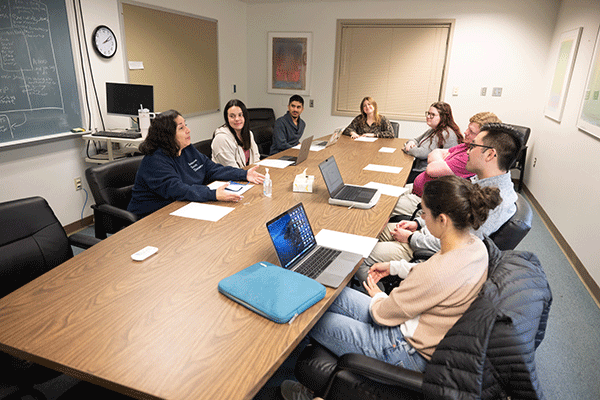
Psychology General (MA MS)
Master's
-

School Psychology (EdS)
Graduate Certificate / Licensure Ed Specialist
-
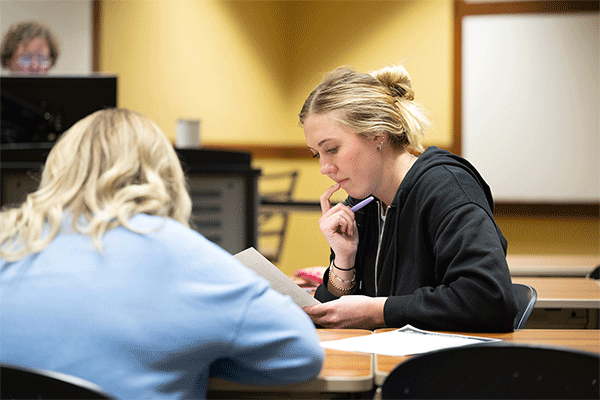
School Counseling (MEd)
Master's
